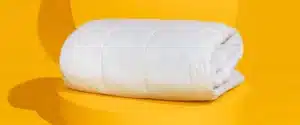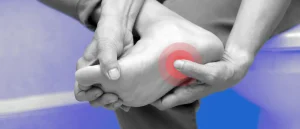Eat This to Sleep Like a Baby
- By Alicia Tyler
- Fact-checked by Joy Ferguson
- April 25, 2023
Fast Facts
- Sleep is essential to long-term health, but approximately 70 million Americans suffer from chronic sleep problems.
- The foods you eat throughout the day may have an impact on how well you sleep at night.
On the dreaded nights when you find yourself tossing, turning, and struggling to fall asleep, your first instinct might be to think back to how much caffeine you had that day. Or you might blame stress and the long to-do list you didn’t complete.
But sometimes, it isn’t the cup of Joe you had at lunch or the mountain of work ahead of you. The foods you eat during the day may affect whether or not you’re able to drift peacefully off to sleep at night.
How Food Impacts Sleep
We depend on consistent, quality sleep to help us recover, repair, and be at our best the next day, yet about 35 percent of Americans get less than the recommended seven hours of sleep per night. According to the CDC, approximately 70 million Americans suffer from chronic sleep problems.
Getting enough zzzs doesn’t just make us more productive, it’s essential to long-term health. Failing to get enough may lead to all sorts of health conditions (1) like high blood pressure, diabetes, heart failure, a compromised immune system, lower libido and mental health issues such as depression.
But even if you’re seemingly doing everything right: powering down devices at least one hour before bedtime, turning in early, and avoiding caffeine past noon, you may still find yourself staring at the ceiling if your diet isn’t quite right.
Researchers have found that diets high in processed foods (2), salt (3), sugars (4), saturated fat (5), spicy foods (6), alcohol (7, 8), and simple, refined carbs (9, 10) may all have a negative impact on sleep, while plant-forward diets with plenty of healthy fats, lean proteins, and complex carbs may have the opposite effect and help support deep, restorative sleep (11).
- The foods you eat during the day may affect whether or not you’re able to sleep at night
- Approximately 70 million Americans suffer from chronic sleep problems
- About 35 percent of Americans get less than the recommended seven hours of sleep per night
What to Eat—and Drink—for Deeper, More Restorative Sleep
1. The Mediterranean diet
The Mediterranean diet, which evolved over thousands of years in countries surrounding the Mediterranean Sea, was popularized in North America decades ago and has been embraced around the world for good reason. Not only is it fresh, delicious, and versatile, but it’s also famous for being one of the top diets for some of the world’s centenarians (12).
If potentially helping people live beyond 100 isn’t enough, you may want to add “best diet for sleep” to the Mediterranean diet’s resume. Comprised of whole grains, vegetables and fruits, fish, heart-healthy fats like olive oil, nuts, seeds, legumes, and small amounts of high-quality lean proteins, studies suggest that the Med diet may have a positive impact on sleep in study participants.
Studies provide some evidence for the role of the diet in better sleep for several reasons. One of them being, foods like fatty fish, milk, tart cherry juice, and kiwifruit that are found on Mediterranean menus and contain some nutrients that may support sleep. For example, kiwi contains serotonin; tart cherry juice contains melatonin, and fatty fish contains vitamin D; all nutrients that have been associated with supporting sleep (13).
And in another sleep study, participants that followed a Mediterranean diet were found to have substantially better sleep quality than those participants who did not. Since obesity and unhealthy eating habits have been linked with sleep disturbances, it’s interesting that researchers observed an association between eating the Mediterranean diet’s variety of nutrient-dense foods and a smaller waist circumference and less obesity (14).
2. Soybeans and lima beans
The next time you order sushi for dinner, throw in an order of edamame. These tasty soybeans just may help you sleep more soundly.
In a study done with 440 medical students using the Pittsburgh Sleep Quality Index (PSQI), researchers had students eat a variety of foods including dark chocolate, dairy, spices, processed meats, lima beans, and more. Significant positive associations were found between sleep quality and the consumption of soybeans and lima beans.
After eating soybeans, participants were 2.5 times more likely to sleep better and after consuming lima beans, they were 6.57 times more likely. Both beans can boost melatonin in the body, a hormone that helps the body transition to sleep (15).
3. Complex carbs
In the same study on medical students, complex carbohydrates were also shown to improve sleep quality. After consuming complex carbs, the students slept 3.26 times better. Examples of foods that contain complex carbs are whole-wheat bread, oatmeal, quinoa, sweet potatoes and barley.
The reason? Tryptophan, which is found in these complex carbs, can help to increase melatonin, the aforementioned hormone that promotes sleepiness. Selenium, another nutrient found in complex carbs, such as whole-grains, has been linked to extended sleep (16).
4. Vitamin D
Vitamin D, also known as “the sunshine vitamin” is well-known for its ability to support bone health and immune function (17). But a lesser-known benefit of vitamin D may be that it’s a potential boon for sleep: Some studies suggest that low levels of vitamin D may be associated with sleep disturbances.
Vitamin D also plays a role in the production of melatonin—are you seeing a theme here?—which helps regulate one of our circadian rhythms, our 24-hour sleep-wake cycle (18). Vitamin D deficiency has also been associated with a higher risk of sleep disorders (19).
Vitamin D is both a nutrient we eat and a hormone our bodies produce. You can get it from food, with the best sources of vitamin D found in fish liver oils such as cod liver oil, and the flesh of fatty fish, such as salmon, swordfish, tuna, and sardines. If fish isn’t your thing, you can also get your daily intake in supplement form.
- Studies suggest that the Med diet may have a positive impact on sleep in study participants.
- Significant positive associations have been found between sleep quality and the consumption of soybeans and lima beans.
- Tryptophan, which is found in complex carbs, can help to increase melatonin.
5. Chamomile tea
It’s better not to drink just before bed to avoid nighttime trips to the bathroom, but what you drink earlier in the evening may be just as important as what you eat and drink throughout the day—and it might be time to trade in your evening nightcap for a cup of tea.
Chamomile tea, an herbal remedy as old as time, has long been a slumber go-to. Researchers suggest that its possible sedative effects may be thanks to a flavonoid called apigenin, which, in studies, appears to exhibit benzodiazepine-like hypnotic activity in the brain which may help to slow down the body and brain allowing you to sleep faster (20). In another study, half the subjects, postpartum women suffering poor sleep quality, drank chamomile tea for two weeks. Compared with the control group, the tee-totallers showed significantly reduced sleep quality problems (21).
6. Golden milk
If you’re feeling peckish before bed but don’t want to risk a heavy meal that could interfere with sleep, try golden milk. More robust than a tea, golden milk contains ingredients that are associated with improved sleep quality, including tryptophan (22) found in the milk, curcumin, a compound found in turmeric and considered to have countless health benefits in Ayurveda, including the ability to induce calm (23), and cinnamon (24), which may help to stabilize blood sugar, a process that may be beneficial for quality sleep.
Try it: Whisk together 1 cup milk, 1/2 tsp. turmeric, a pinch of black pepper, a few shakes of cinnamon and enjoy warm or cold.
7. Tart cherry juice
You’ve probably heard the media buzz around tart cherry juice for everything from muscle recovery and joint health to improved sleep. And it turns out, this fruit juice may hold some promise of improvements for those suffering from insomnia.
In a recent study (25), eight participants with insomnia were given either cherry juice or a placebo, and those that drank cherry juice saw significant increases in their sleep time and efficiency. Researchers suggest that procyanidin B-2, a polyphenol in tart cherry juice, may be partially responsible for the improvements in insomnia. In the study, procyanidin B-2 inhibited something called 3-dioxygenase (IDO) and increased the availability of tryptophan, the well-known amino acid that plays a role in sleep. If you try it, just be sure to choose a cherry juice that’s concentrated and unsweetened like Montmorency Tart Cherry Juice, which half the study participants were given.
Sleep and Diet Are a Two-Way Street
While what you eat may influence how well you sleep, how well you sleep may also influence what you eat. Just think about the food you crave after a late-night bender; likely they’re mostly high-calorie foods. It’s no coincidence that you crave these foods when you’re sleep-deprived. In that state, ghrelin and leptin, two hormones that are designed to regulate feelings of satiety and feelings of fullness, may be triggered and signal the brain to consume calories (26). So just as it can be important to fuel the body with foods that support sleep, it may be just as key to get enough sleep to help prevent a fast-food binge the next day.
The Bottom Line
References:
1. Team, Brain And Spine. “Here’s What Happens When You Don’t Get Enough Sleep (and How Much You Really Need a Night).” Cleveland Clinic, 25 Mar. 2022, health.clevelandclinic.org/happens-body-dont-get-enough-sleep.
2. Sousa, Raíssa d.S., Maylla L.B.M. Bragança, Bianca R.d. Oliveira, Carla C.N.d.S. Coelho, and Antônio A.M.d. Silva. 2020. “Association between the Degree of Processing of Consumed Foods and Sleep Quality in Adolescents” Nutrients 12, no. 2: 462. https://doi.org/10.3390/nu12020462
3. Teng, Kathryn, MD. “Too Much Salt Is Bad — For Your Heart and Your Sleep.” Cleveland Clinic, 4 Sept. 2020, health.clevelandclinic.org/salt-and-sleep.
4. Gangwisch, J. E., Hale, L., St-Onge, M. P., Choi, L., LeBlanc, E. S., Malaspina, D., Opler, M. G., Shadyab, A. H., Shikany, J. M., Snetselaar, L., Zaslavsky, O., & Lane, D. (2020). High glycemic index and glycemic load diets as risk factors for insomnia: analyses from the Women’s Health Initiative. The American journal of clinical nutrition, 111(2), 429–439. https://doi.org/10.1093/ajcn/nqz275
5. St-Onge MP, Roberts A, Shechter A, Choudhury AR. Fiber and Saturated Fat Are Associated with Sleep Arousals and Slow Wave Sleep. J Clin Sleep Med. 2016 Jan;12(1):19-24. doi: 10.5664/jcsm.5384. PMID: 26156950; PMCID: PMC4702189. https://pubmed.ncbi.nlm.nih.gov/26156950/
6. Nisar M, Mohammad RM, Arshad A, Hashmi I, Yousuf SM, Baig S. Influence of Dietary Intake on Sleeping Patterns of Medical Students. Cureus. 2019;11(2):e4106. Published 2019 Feb 20. doi:10.7759/cureus.4106 https://pubmed.ncbi.nlm.nih.gov/31058000/
7. Ebrahim IO, Shapiro CM, Williams AJ, Fenwick PB. Alcohol and sleep I: effects on normal sleep. Alcohol Clin Exp Res. 2013 Apr;37(4):539-49. doi: 10.1111/acer.12006. Epub 2013 Jan 24. PMID: 23347102. https://pubmed.ncbi.nlm.nih.gov/23347102/
8. Zheng D, Yuan X, Ma C, Liu Y, VanEvery H, Sun Y, Wu S, Gao X. Alcohol consumption and sleep quality: a community-based study. Public Health Nutr. 2021 Oct;24(15):4851-4858. doi: 10.1017/S1368980020004553. Epub 2020 Nov 13. PMID: 33183388. https://pubmed.ncbi.nlm.nih.gov/33183388/
9. Katagiri R, Asakura K, Kobayashi S, Suga H, Sasaki S. Low intake of vegetables, high intake of confectionary, and unhealthy eating habits are associated with poor sleep quality among middle-aged female Japanese workers. J Occup Health. 2014;56(5):359-68. doi: 10.1539/joh.14-0051-oa. Epub 2014 Aug 28. PMID: 25168926.https://pubmed.ncbi.nlm.nih.gov/25168926/
10. Min, Chanyang et al. “The association between sleep duration, sleep quality, and food consumption in adolescents: A cross-sectional study using the Korea Youth Risk Behavior Web-based Survey.” BMJ open vol. 8,7 e022848. 24 Jul. 2018, doi:10.1136/bmjopen-2018-022848 https://www.ncbi.nlm.nih.gov/pmc/articles/PMC6059317/
11. Muscogiuri G, Barrea L, Aprano S, Framondi L, Di Matteo R, Laudisio D, Pugliese G, Savastano S, Colao A, on behalf of the OPERA PREVENTION Project. Sleep Quality in Obesity: Does Adherence to the Mediterranean Diet Matter? Nutrients. 2020 May 10;12(5):1364. doi: 10.3390/nu12051364. PMID: 32397621; PMCID: PMC7284844. https://pubmed.ncbi.nlm.nih.gov/32397621/
12. Vasto S, Rizzo C, Caruso C. Centenarians and diet: what they eat in the Western part of Sicily. Immun Ageing. 2012;9(1):10. Published 2012 Apr 23. doi:10.1186/1742-4933-9-10 https://www.ncbi.nlm.nih.gov/pmc/articles/PMC3412743/
13. St-Onge MP, Mikic A, Pietrolungo CE. Effects of Diet on Sleep Quality. Adv Nutr. 2016;7(5):938-949. Published 2016 Sep 15. doi:10.3945/an.116.012336 https://www.ncbi.nlm.nih.gov/pmc/articles/PMC5015038/
14. Muscogiuri G, Barrea L, Aprano S, Framondi L, Di Matteo R, Laudisio D, Pugliese G, Savastano S, Colao A, on behalf of the OPERA PREVENTION Project. Sleep Quality in Obesity: Does Adherence to the Mediterranean Diet Matter? Nutrients. 2020 May 10;12(5):1364. doi: 10.3390/nu12051364. PMID: 32397621; PMCID: PMC7284844. https://pubmed.ncbi.nlm.nih.gov/32397621/
15. Nisar M, Mohammad RM, Arshad A, Hashmi I, Yousuf SM, Baig S. Influence of Dietary Intake on Sleeping Patterns of Medical Students. Cureus. 2019;11(2):e4106. Published 2019 Feb 20. doi:10.7759/cureus.4106 https://www.ncbi.nlm.nih.gov/pmc/articles/PMC6476615/
16. Nisar M, Mohammad RM, Arshad A, Hashmi I, Yousuf SM, Baig S. Influence of Dietary Intake on Sleeping Patterns of Medical Students. Cureus. 2019;11(2):e4106. Published 2019 Feb 20. doi:10.7759/cureus.4106 https://www.ncbi.nlm.nih.gov/pmc/articles/PMC6476615/
17. “Vitamin D.” The Nutrition Source, 2 Mar. 2022, www.hsph.harvard.edu/nutritionsource/vitamin-d.
18. Romano F, Muscogiuri G, Di Benedetto E, Zhukouskaya VV, Barrea L, Savastano S, Colao A, Di Somma C. Vitamin D and Sleep Regulation: Is there a Role for Vitamin D? Curr Pharm Des. 2020;26(21):2492-2496. doi: 10.2174/1381612826666200310145935. PMID: 32156230. https://pubmed.ncbi.nlm.nih.gov/32156230/
19. Gao Q, Kou T, Zhuang B, Ren Y, Dong X, Wang Q. The Association between Vitamin D Deficiency and Sleep Disorders: A Systematic Review and Meta-Analysis. Nutrients. 2018;10(10):1395. Published 2018 Oct 1. doi:10.3390/nu10101395 https://www.ncbi.nlm.nih.gov/pmc/articles/PMC6213953/
20. Srivastava JK, Shankar E, Gupta S. Chamomile: A herbal medicine of the past with bright future. Mol Med Rep. 2010;3(6):895-901. doi:10.3892/mmr.2010.377, https://www.ncbi.nlm.nih.gov/pmc/articles/PMC2995283/
21. Chang, Shao-Min, and Chung-Hey Chen. “Effects of an intervention with drinking chamomile tea on sleep quality and depression in sleep disturbed postnatal women: a randomized controlled trial.” Journal of advanced nursing vol. 72,2 (2016): 306-15. doi:10.1111/jan.12836
22. Paredes SD, Barriga C, Reiter RJ, Rodríguez AB. Assessment of the Potential Role of Tryptophan as the Precursor of Serotonin and Melatonin for the Aged Sleep-wake Cycle and Immune Function: Streptopelia Risoria as a Model. Int J Tryptophan Res. 2009;2:23-36. doi:10.4137/ijtr.s1129 https://www.ncbi.nlm.nih.gov/pmc/articles/PMC3195230/
23. Kim SJ, Son TG, Park HR, Park M, Kim MS, Kim HS, Chung HY, Mattson MP, Lee J. Curcumin stimulates proliferation of embryonic neural progenitor cells and neurogenesis in the adult hippocampus. J Biol Chem. 2008 May 23;283(21):14497-505. doi: 10.1074/jbc.M708373200. Epub 2008 Mar 24. PMID: 18362141; PMCID: PMC2386914.https://pubmed.ncbi.nlm.nih.gov/18362141/
24. Davis, Paul A., and Wallace Yokoyama. “Cinnamon Intake Lowers Fasting Blood Glucose: Meta-Analysis.” Journal of Medicinal Food, vol. 14, no. 9, 2011, pp. 884–89. Crossref, https://doi.org/10.1089/jmf.2010.0180.
25. Losso JN, Finley JW, Karki N, Liu AG, Prudente A, Tipton R, Yu Y, Greenway FL. Pilot Study of the Tart Cherry Juice for the Treatment of Insomnia and Investigation of Mechanisms. Am J Ther. 2018 Mar/Apr;25(2):e194-e201. doi: 10.1097/MJT.0000000000000584. PMID: 28901958; PMCID: PMC5617749., https://pubmed.ncbi.nlm.nih.gov/28901958/
26. Greer SM, Goldstein AN, Walker MP. The impact of sleep deprivation on food desire in the human brain. Nat Commun. 2013;4:2259. doi: 10.1038/ncomms3259. PMID: 23922121; PMCID: PMC3763921. https://pubmed.ncbi.nlm.nih.gov/23922121/











